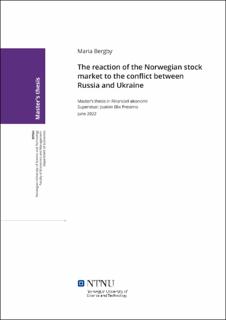| dc.contributor.advisor | Prestmo, Joakim Blix | |
| dc.contributor.author | Bergby, Maria | |
| dc.date.accessioned | 2022-07-15T17:20:46Z | |
| dc.date.available | 2022-07-15T17:20:46Z | |
| dc.date.issued | 2022 | |
| dc.identifier | no.ntnu:inspera:114729398:23473449 | |
| dc.identifier.uri | https://hdl.handle.net/11250/3005930 | |
| dc.description.abstract | Når Russland invaderte Ukraina 24.02.2022, sendte det sjokkbølger gjennom aksjemarkedet. Da dette skjedde, så samlet verden seg og fordømte invasjonen ved å innføre sanskjoner mot Russland vise støtte til Ukraina.
Denne masteroppgaven analyserer om invasjonen hadde en negativ innvirkning på det norske og det russiske aksjemarkedet gjennom en “hendelsesstudie”. Ved å bruke data for hovedindeksen for Oslo Børs (OSEBX), og hovedindeksen for Russland (MOEX), så fant ci at hendelsen hadde en negativ påvirkning på indeksene. Den unormale avkastningen på hendelsesdagen, var bare signifikant for MOEX. Vi sammenlignet også avkastningene fra tidligere kriger, og fant at krigen mellom Russland og Ukraina hadde mer volatil avkastning i “hendelsesvinduet”.
Videre så vi på “negativitetseffekten” (Akthar et al., 2011) og volatiliteten ved å bruke GARCH modeller. Vi fant at positive nyheter hadde størst påvirkning på OSBEX, og at negative nyheter hadde størst påvirkning på MOEX. Resultatene antydet også at konflikten mellom Russland og Ukraina økte volatiliteten for indeksene. | |
| dc.description.abstract | When Russia invaded Ukraine 24.02.2022, it sent shock-waves through the stock market. As a response, the world came together and condemned the invasion by imposing sanctions on Russia and showing support to Ukraine.
This master’s thesis analyses whether the invasion had a negative impact on the Norwegian and the Russian stock market through an event study. Using data for the Oslo Benchmark Index (OSEBX), and Moscow Exchange (MOEX), we found that the event had a negative impact on the indices. However, the abnormal return on the event day, was only significant for MOEX. We also compared the returns of former wars, and found that the Russo-Ukraine had more volatile returns in the event window.
Further, we looked at the “negativity effect” (Akthar et al., 2011) and volatility using GARCH models. We found that positive news had a more significant impact on OSEBX, and that negative news had a more significant impact on MOEX. The results also suggested that the conflict between Russia and Ukraine increased the volatility for the indices. | |
| dc.language | eng | |
| dc.publisher | NTNU | |
| dc.title | The reaction of the Norwegian stock market to the conflict between Russia and Ukraine | |
| dc.type | Master thesis | |
